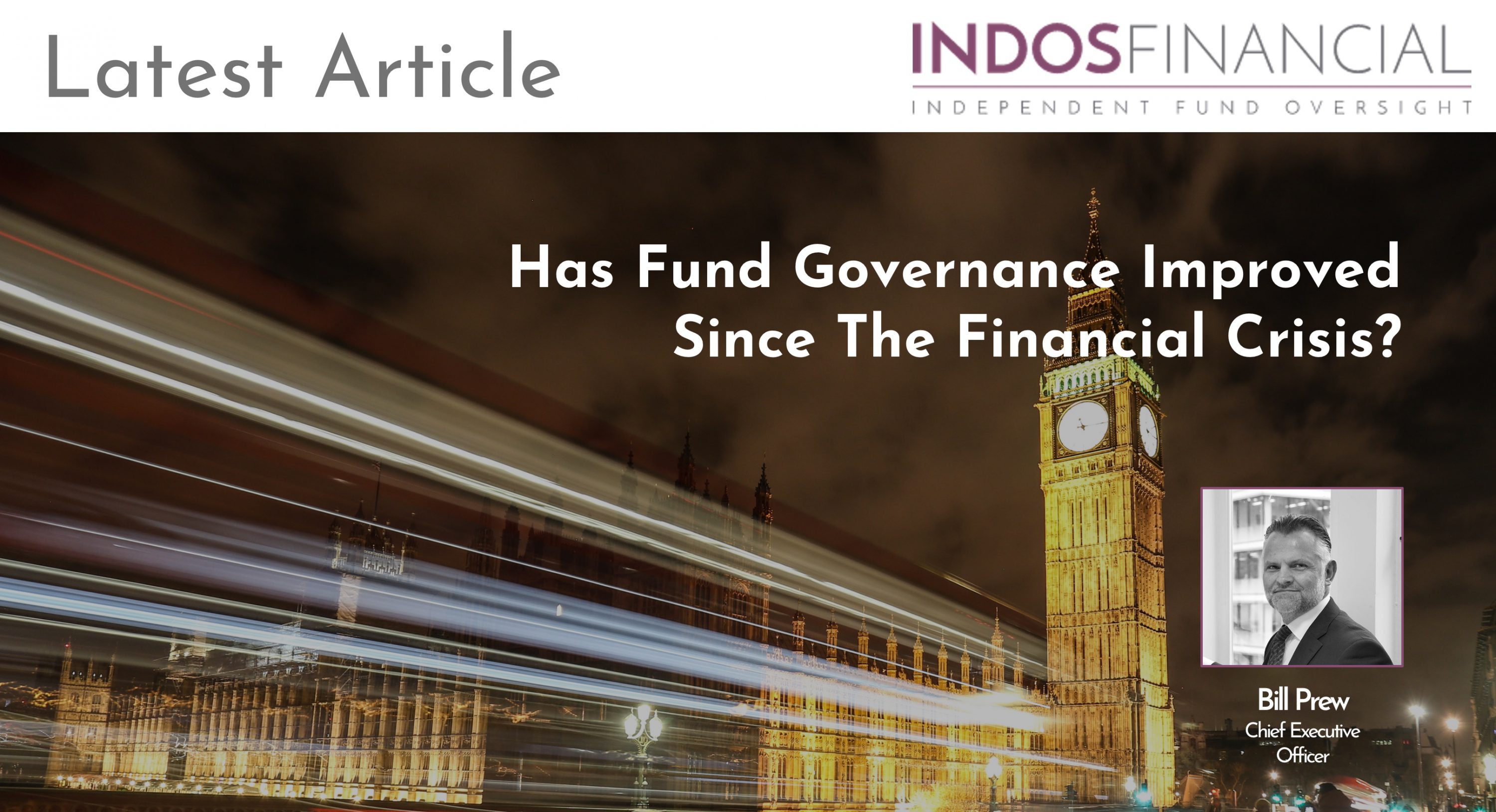The 2008 financial crisis revealed many corporate governance deficiencies at alternative funds. Twelve years on, Covid-19 is causing a different set of challenges. Bill Prew, CEO of independent depositary INDOS Financial, assesses whether governance practices in the industry have improved and if investors’ interests are now being better safeguarded.
The 2008 financial crisis exposed many deficiencies in corporate governance practices in the alternative funds industry. Not only was it revealed that a lot of offshore boards failed to prevent managers from succumbing to style drift and investment mandate breaches, but when the crisis hit, many directors simply permitted firms arbitrarily to impose gates and suspend redemptions without proper consideration being given to the best interests of investors. Many were left trapped in funds for long periods as a result.
As markets stabilised, investors made it clear that some directors had neglected their fiduciary responsibilities and promptly demanded reform. Twelve years on from the financial crisis, Covid-19 is causing a different set of challenges.
Driving up standards
Since the financial crisis, fund governance has largely improved, in part because of the pressure exerted by investors. In the years after the crisis, investors started clamping down on managers appointing so-called “jumbo” directors who were sitting on a large number of boards. This came amid concerns that some directors were overstretched and would be unable to perform their roles adequately in a crisis scenario.
Elsewhere, investors insisted boards be comprised of more independent directors so as to minimise any potential conflicts. Other clients asked that boards become more diverse in terms of skill-sets and expertise, amid concerns that people from the legal and fund administration professions disproportionately dominated directorships.
Regulators have been equally proactive. The Alternative Investment Fund Managers Directive (AIFMD) was introduced in Europe in 2014 and raised standards in areas such as risk management and oversight, including through the introduction of the fund depositary to oversee the operations of funds. A number of depositaries have been praised for providing useful information to fund boards enabling them to fulfil their fiduciary duties.
Local regulators in Europe have taken further measures too. For example, the Central Bank of Ireland (CBI), introduced the CP86 framework, which among other things requires funds to have at least two, independent, Irish-resident directors on their boards. CP86 also stipulates that directors demonstrate they have sufficient capacity to perform their roles adequately.
Similarly, the UK Financial Conduct Authority (FCA) implemented the Senior Managers & Certification Regime (SMCR) as part of its efforts to improve accountability in the financial services industry. This – along with several “Dear CEO” letters – has resulted in managers taking governance more seriously.
However, improvements are not uniform across the alternatives industry. Governance practices in open-ended hedge fund strategies are generally regarded as being stronger than long term closed-ended fund structures, where investors are often content to invest in funds that do not have independent directors acting in their best interests or holding managers to account. Unlike open-ended funds, many closed-ended structures have historically fallen outside regulation. This is particularly true for private equity funds established in the Cayman Islands.
However, this is set to change in August 2020 with the introduction of the Cayman Islands Private Funds Law, which will subject private equity firms to regulatory registration requirements, and depositary provisions largely based on AIFMD.
There are also nuances in corporate governance practices between alternative funds and other fund structures such as UK-listed funds. Some argue that governance in alternative funds is more process driven than in listed funds, where directors are usually required to take a more strategic, hands-on approach.
Governance amid Covid-19
Covid-19 continues to cause significant disruption across financial markets and has forced asset management firms and their service providers to execute their business continuity planning (BCP) programmes and remote working operations.
Despite today’s significant challenges, boards cannot let standards slip nor take short-cuts, otherwise the interests of investors risk being compromised. Many fund directors, having experienced the 2008 financial crisis, are now better equipped to deal with the challenges presented by Covid-19.
They will need to maintain board effectiveness by monitoring and overseeing managers’ contingency efforts and assess whether or not they are effective. Boards should also be aware of investor enquiries and support them by probing managers about the operational resiliency of their critical service providers. In addition, directors must seek assurances from asset managers that they have credible back-up plans in place should their primary vendors encounter difficulties.
The social distancing measures are creating challenges for boards themselves insofar as they have not been able to meet physically. In response, directors have adapted by leveraging virtual communications technology and appear to be meeting more regularly as a result.
Boards will also be focusing extensively on the viability of the investment manager’s operations, key person risk and the quality and level of management information being provided to them in a timely fashion – including on valuation, liquidity, and the ability to deal with heightened redemption activity.
How will fund governance evolve?
There are no signs that fund manager governance standards will be allowed to relax. Investors and regulators continue to push for higher standards and there will be more consistency across fund types and domiciles. Evolving substance requirements in offshore jurisdictions mean directors will demand better quality information to oversee the fund.
Capacity, independence, and competence of directors will also continue to be prominent themes, and managers themselves will be under regulatory pressure to raise their own internal governance standards. Finally, more emphasis will be given to the environmental and social consequences of investments and how managers run their operations.
This article was first featured on Institutional Asset Manager: https://www.institutionalassetmanager.co.uk/2020/05/21/285801/has-fund-governance-improved-financial-crisis




